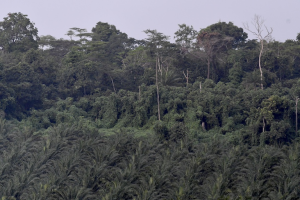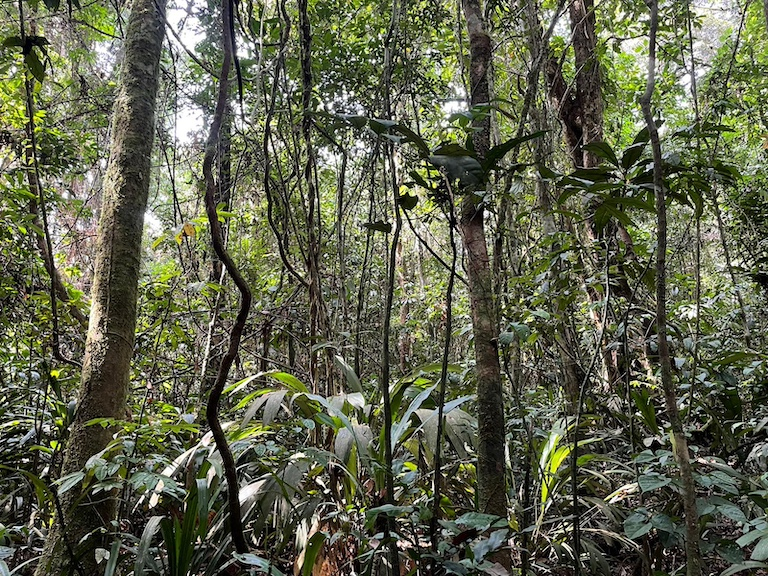- For more than a decade, communities in Liberia have struggled against palm oil company Golden Veroleum Liberia (GVL), which has razed more than 1,000 hectares (almost 2,500 acres) of rainforest, destroyed sacred sites, and violated their land rights, leading the Roundtable on Sustainable Palm Oil (RSPO) to issue a stop-work order.
- Then, in June, the RSPO reversed its ruling, raising concerns over the fate of Liberia’s dense forests and communities, despite the long list of allegations.
- “There is of course another path. The RSPO can stand on its stated principles and maintain the stop-work order,” a new op-ed argues.
- This is a commentary.
- The views expressed are those of the author, not necessarily of the Oracle News Daily.
- In the forests of southeastern Liberia, fear is resounding over what the future may hold. For more than a decade, communities in Sinoe County have struggled against palm oil company Golden Veroleum Liberia (GVL), which has raised more than 1,000 hectares (almost 2,500 acres) of rainforest, destroyed sacred sites, and violated local land rights.
GVL’s abuses were affirmed by the Roundtable on Sustainable Palm Oil (RSPO), the industry certification body, and by the High Carbon Stock Approach (HCSA), a multistakeholder initiative aimed at protecting forests.
Following years of community resistance and a formal complaint, the RSPO issued a stop-work order for GVL to halt plantation expansion. But this past June, the RSPO announced it was lifting the moratorium, raising concerns over the fate of globally significant forests and the communities that live there.
Today, Liberian civil society and international allies are urgently demanding that the RSPO reverse its decision and maintain its stop-work order on GVL’s expansion to prevent further deforestation, protect communities’ rights, and ensure accountability for the company’s environmental and human rights violations.
Notably, GVL is controlled by Indonesian palm oil giant Golden Agri Resources (GAR), a member of the RSPO, with its own history of alleged illegal forest clearance, corruption and human rights abuses.
A Golden Veroleum Liberia oil plantation abuts a forested buffer. Image by Jonathan H. Timperley.
For years, the RSPO has faced criticism for providing cover to member companies engaged in abuse. By reversing its decision on GVL — despite research showing the company is failing to meet conditions set out by sustainability bodies — the RSPO risks further damage to its sinking credibility, while paving the way for renewed conflict.
Since GVL’s arrival in Liberia in 2010, the company has faced extensive allegations of land grabbing, environmental degradation and violence. Community members describe how GVL appeared with armed police to force villagers to sign agreements with the company, began leveling forests without the consent of communities, and desecrated a sacred hill.
In 2018, the RSPO affirmed what communities had been saying for years: that GVL did not receive the free, prior and informed consent (FPIC) of communities to operate on their lands, instead employing violence and intimidation.
In the same year, my organization, Friends of the Earth, filed the first ever complaint with the HCSA documenting GVL’s destruction of dense forests.
In 2021, the HCSA concluded that GVL had destroyed more than 1,000 hectares of Liberia’s Upper Guinea Rainforest — a sensitive and threatened ecosystem, home to communities that depend on the forest as the source of their culture and livelihoods — as well as endangered chimpanzees and pygmy hippos.
The HCSA determined that the RSPO stop-work order should be maintained until GVL rehabilitates the forests it decimated, develops an integrated conservation land-use plan, and renegotiates agreements with affected communities.
In response, GVL and parent company GAR developed action plans to right their wrongs. GAR was a founding member of the HCSA before it dropped out of the body after it ruled against both companies. GAR’s palm oil appears in the supply chains of the world’s largest consumer brands, including Procter & Gamble, Unilever, and Nestlé.
According to Forests & Finance, GAR’s top investors include BlackRock, Vanguard, and Silchester International.
Forest surrounding a Golden Veroleum Liberia oil palm plantation. Image by Jonathan H. Timperley.
Four years on, Liberian and international civil society groups say that GVL and GAR have not restored any forests, have not developed the required conservation land-use plan, and have not renegotiated agreements with several impacted communities.
Despite these failures, in June 2025, the RSPO stated that it was lifting the stop-work order on GVL, paving the way for the company to avoid its responsibilities of forest restoration and ramp up its destructive operations.
In a further twist in this sad story of corporate unaccountability, the HCSA announced last year that it would be shuttering its offices. While its tenure may be coming to an end, the body still supports implementation of its decision in the GVL case, including maintaining the stop-work order.
In July, the HCSA wrote to the RSPO expressing concerns over the decision to lift the stop-work order and the lack of remediation delivered to affected communities.
Time and time again we see that voluntary sustainability bodies lack teeth and the means to compel companies to implement their decisions. 
What’s notable in the case of GVL and GAR is that these companies committed to implementing the HCSA’s recommendations, and despite failing to do so, are now being given a green light by the RSPO to expand operations without any semblance of accountability for the destruction they’ve caused.
Back in Sinoe County, memories of the riot that broke out on GVL’s plantation a decade ago are fresh enough to serve as warning that community resistance is all but guaranteed if the company decides to bulldoze its way.
There is of course another path. The RSPO can stand on its stated principles and maintain the stop-work order.
The government of Liberia can fulfill its responsibilities by enforcing the moratorium on expansion, upholding the country’s landmark Land Rights Act, thus protecting communities’ legal rights to their customary lands, and promoting systems of community forestry and land governance that directly benefit rightsholders.
In southeastern Liberia, the majestic trees stand tall, waiting and watching. The question is, for how long?
Gaurav Madan is a senior forests and land rights campaigner at Friends of the Earth.
- First published by Mongabay


